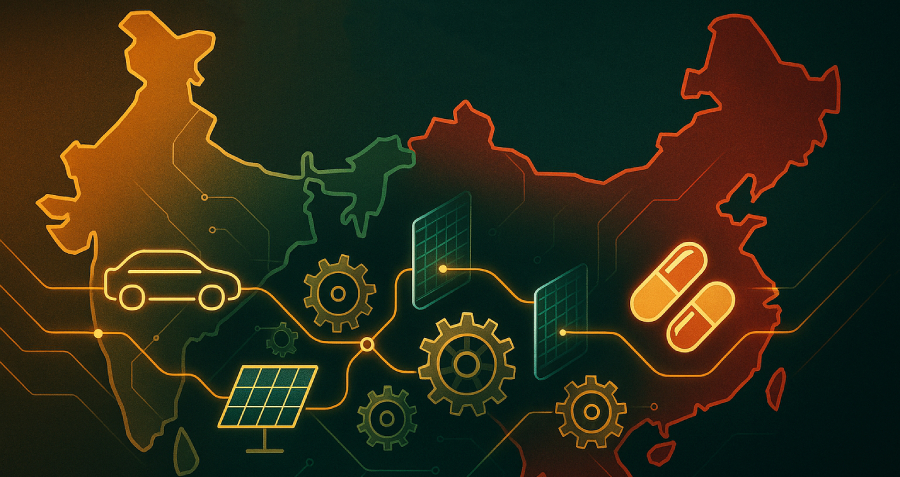Dr. Edward Tse, Founder & CEO, Gao Feng Advisory Company; Professor of Managerial Practice of Strategy, CKGSB
With the implementation of RCEP, more companies in the region will view Chinese innovations as a source of inspiration and knowledge and shall use them not only for producing and selling new products and services but also for designing new business models.
Over the last decade or so, China has evolved from being perceived as a copycat to an economy known for innovation. Numerous successful entrepreneurs have built companies with remarkable innovations to their credit. Innovation emerged in a wide range of segments of the economy and a large number of companies have leveraged technology to build their businesses. The most prevalent technology platform has been the wireless internet which is now accompanied by the industrial internet, internet of things, artificial intelligence, cloud computing, 5G and blockchain technology.
Some companies have acquired dominant positions in China and would naturally now look for overseas expansion opportunities. RCEP countries constitute a natural destination of choice. Companies in RCEP countries are already in fact learning from Chinese innovations. This phenomenon can be seen throughout RCEP countries in areas such as e-commerce, social commerce, mobile payment and mobility-as-a-service. China has reduced the cost of leading technologies, benefiting the public, and changing many people’s lives. RCEP countries are gaining a great deal as their lifestyles are being affected by these changes. Chinese businesses continue to invest into these markets, raising local innovation, supporting these economies, improving their public services and creating symbiotic relationships with local players and governments.
According to Nikkei Asia, the shared economy, home deliveries and live streaming have increased significantly in Japan in the last few years, and Japanese entrepreneurs are now “copying China”. Founder and Chairman of Inforich of Japan Akiyama Hiroxuan first learned about shared power bank rental services in 2016 from the Chinese. He saw its market potential, as smartphones are of key importance in modern digitalized lifestyles, so he launched a shared power bank service called ChargeSPOT in 2018, which currently owns over 90% of the Japanese market.

In 2019, Alibaba cooperated with Amorepacific, South Korea’s leading cosmetics company, to digitalize its shopping experience, facilitate online to-offline sales, gain better consumer insights and explore overseas markets. Late last year, Alibaba also launched a data center in South Korea.
In Australia, Alipay has partnered with the payment service provider Quest to co-develop payment solutions in e-commerce. Alipay is simultaneously working with Chemist Warehouse, an Australian pharmaceutical company, to bolster its online e-commerce platform, and to popularize China’s famous shopping festivals such as Double Eleven.
Singapore Prime Minister Lee Hsien Loong repeatedly praised China’s mobile payment systems in his national day speech on August 20, 2017. He said a smart country has to be inseparable from its own mobile payment system, and Singapore needs to actively learn from China’s electronic payment system. He said he had actively witnessed China change significantly over the last three decades, all the way from infrastructure, airports, high-speed rail, to telecommunications.
Chinese companies are investing throughout Southeast Asia, spreading their innovative products and services. The China Investment Research Institute says in the last three years Southeast Asia has received more than USD $26.3 billion of investment, of which China accounts for 46.8%. Major investors include internet giants Alibaba and Tencent. Tencent has invested in Gojek, Indonesia’s on-demand multi-service platform, and Alibaba acquired Mynt, the first unicorn in the Philippines to focus on fintech and digital payment systems. Besides digital banking and mobile payments, China’s Hellobike is exploring the potential for two wheelers in Southeast Asian markets as the cost of four-wheeled vehicles is still out of reach for most of their people. The growing presence of Chinese companies is leading to Southeast Asian markets Will RCEP Facilitate Asia’s Dominance of the Digital Economy? to rapidly adopt innovations, technologies, and business models used by Chinese firms.

In 2021, TikTok launched its live e-commerce business in Indonesia. Google research says over 69% of people surf its app over five times daily and the pandemic, lockdowns and quarantines have further boosted demand for e-commerce and entertainment streaming. The new business model created by China has become popular in Southeast Asia.
In the Philippines, Ace International, a Chinese media advertising solutions provider has already cooperated with more than 400 companies in 10 major business districts of Manila, replicating China’s Focus Media business model.
In Thailand, Huawei was bestowed the 2020 “Digital International Enterprise of the Year” award. Thai Prime Minister Prayut has emphasized the importance of innovative technologies to promote digitalization while praising Huawei for its contribution to local development, digital transformation, and economic and social development. Huawei has provided Thailand telemedicine systems and AI-assisted diagnosis and treatment facilities, greatly contributing to prevention and control of the COVID pandemic. Huawei has also helped Thailand design a program “Seeds for the Future” to cultivate talents, besides launch of the 5G Ecological Innovation Center in Bangkok.
Clearly, geopolitics creates much uncertainty surrounding cross-border businesses which constitutes potential barriers to adoption of Chinese innovations by RCEP countries or to formation of partnerships with Chinese tech companies. Nonetheless, we expect that with the formal implementation of the RCEP, more companies in the region will view Chinese innovations as a source of inspiration and knowledge and shall use them not only for producing and selling new products and services but also for designing new business models. While we must not ignore the realities of geopolitics and other factors, we can expect more and new forms of partnerships to emerge, enhancing the competitive advantages of the region and generating more win-win situations.






















